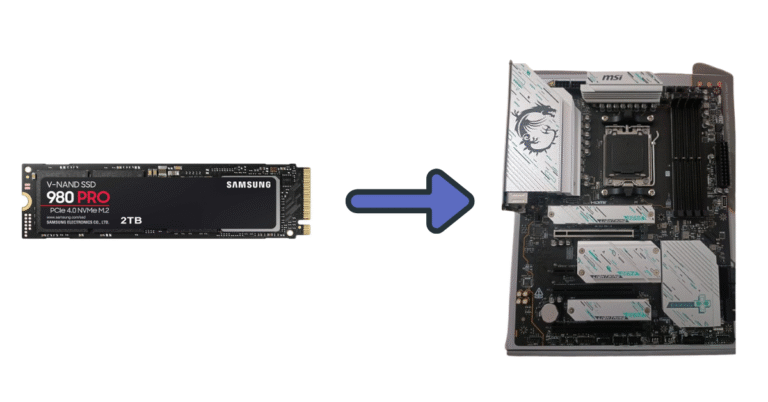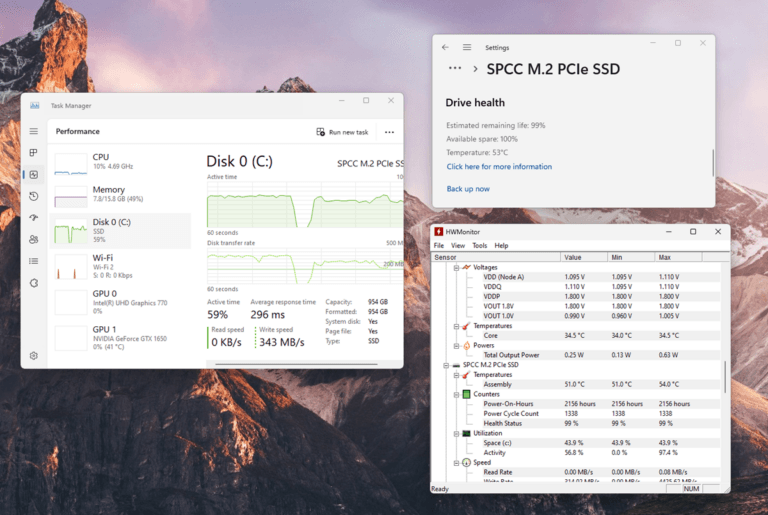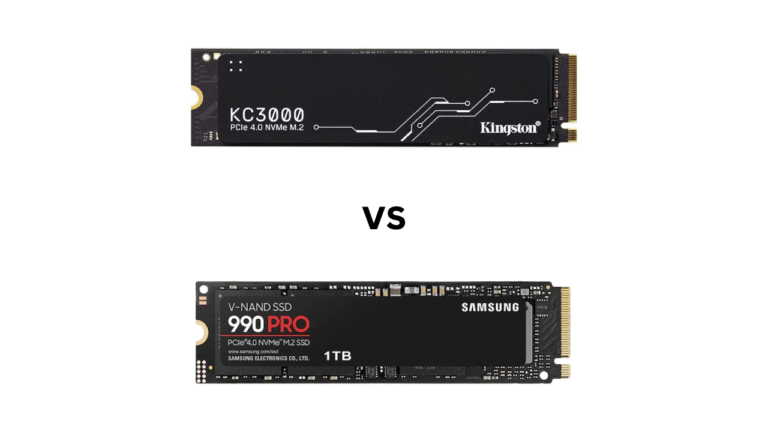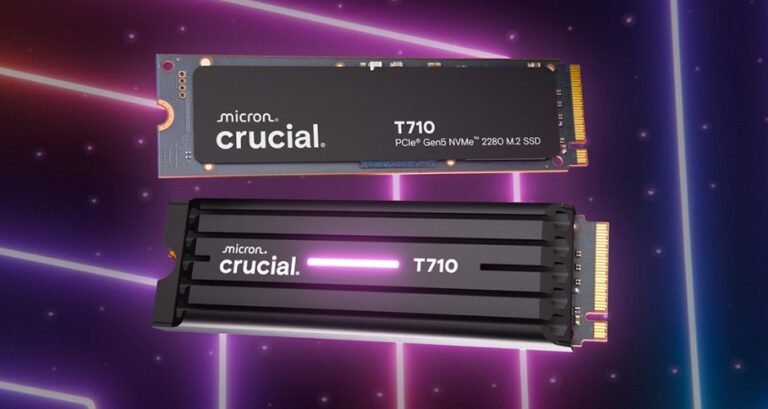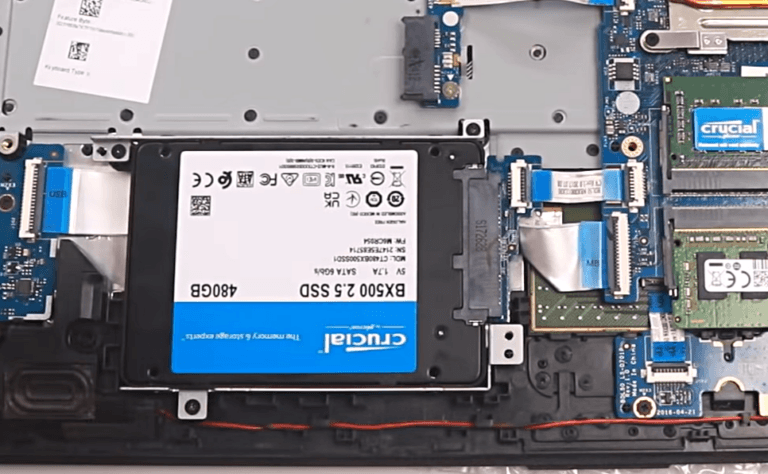Affiliate Disclosure: This post may include affiliate links. If you click and make a purchase, I may earn a small commission at no extra cost to you.
In the high-end Gen 5.0 NVMe SSD category, the Crucial T710 and Samsung 9100 Pro are the top contenders. Obviously, the SN8100 is at the top, but these two are the best competitors to date. So, for some reason, if you are not picking the SN8100, you still have a solid option, and these two are the picks for you. But there is a lot of confusion.
The Crucial T710 is available in 1TB, 2TB, and 4TB variants, while the 9100 Pro offers 1TB, 2TB, 4 TB, and an additional 8 TB option. The theoretical sequential and random read/write numbers are almost similar. Both are DRAM SSDs with TLC NAND flash. So, there are many similarities between the two, but I think the price difference will decide your selection. The 9100 Pro is way cheaper than the T710, and yet the performance difference is minimal.
Overall, the Crucial T710 delivers better performance in gaming, write speeds, low-queue random workloads, transfer rates, and power efficiency, making it the stronger choice for everyday use and gaming setups. Meanwhile, the Samsung 9100 Pro edges ahead in PCMark productivity scores, sequential QD1 reads, and high-queue random workloads, favoring heavy multitasking or workstation scenarios. In short, the T710 is the more responsive and efficient all-rounder, while the 9100 Pro shines under sustained, parallel workloads.
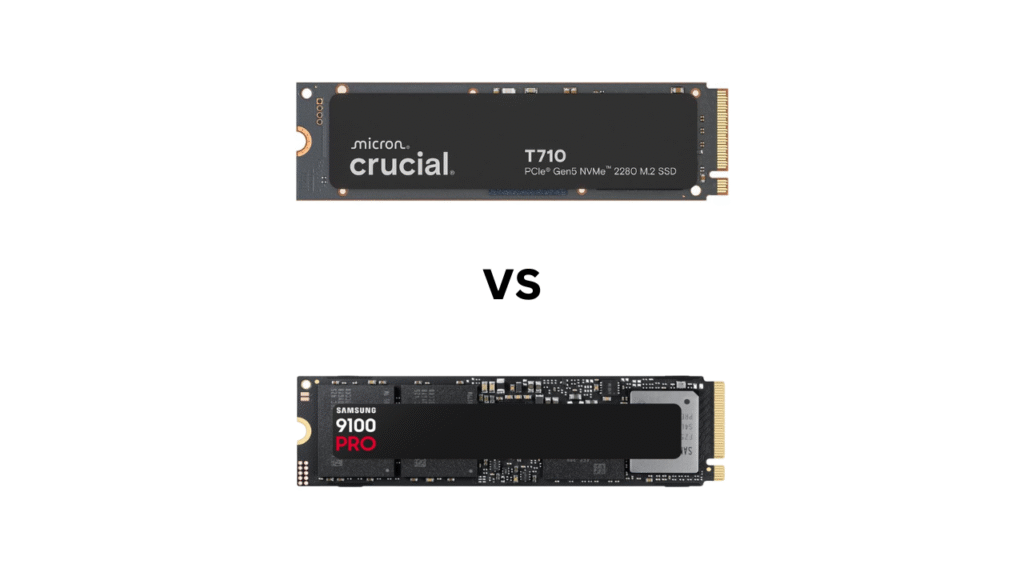
However, there are many reasons to choose both, and we will explore them in detail in this article. So, let’s get started.
Theoretical Specifications
| Specification | Crucial T710 | Samsung 9100 Pro |
|---|---|---|
| PCIe Generation/NVMe Version | PCIe Gen 5.0 x4/ NVMe 2.0 | PCIe Gen 5.0 x4/ NVMe 2.0 |
| Release Date | May 19th, 2025 | Feb 27th, 2024 |
| Capacities | 1TB, 2TB, 4TB | 1TB, 2TB, 4TB, 8TB |
| Sequential Read Speed | 1TB: 14,900 MB/s 2TB: 14,500 MB/s 4TB: 14,500 MB/s | 1TB: 14,700 MB/s 2TB: 14,700 MB/s 4TB: 14,800 MB/s 8TB: 14,800 MB/s |
| Sequential Write Speed | 1TB: 13,700 MB/s 2TB: 13,800 MB/s 4TB: 13,800 MB/s | 1TB: 13,300 MB/s 2TB: 13,400 MB/s 4TB: 13,400 MB/s 8TB: 13,400 MB/s |
| Random Read Speed | 1TB: 1,800K IOPS 2TB: 2,200K IOPS 4TB: 2,200K IOPS | 1TB: 1,850K IOPS 2TB: 1,850K IOPS 4TB: 2,200K IOPS 8TB: 2,200K IOPS |
| Random Write Speed | 1TB: 2,200K IOPS 2TB: 2,300K IOPS 4TB: 2,300K IOPS | 1TB: 2,600K IOPS 2TB: 2,600K IOPS 4TB: 2,600K IOPS 8TB: 2,600K IOPS |
| NAND Flash | Micron B68S FortisFlash TLC (276-layer) | Samsung’s V8 V-NAND TLC (236-layer) |
| DRAM | Yes | Yes |
| Controller | Silicon Motion SM2508 | Samsung Presto (S4LY027) |
The theoretical performance numbers are almost identical. However, the V8 V-NAND in the 9100 is much faster in terms of raw performance compared to Micron’s B68S. Both drives are using the NVMe 2.0 versions and are fully fledged Gen 5.0 drives. To make the most of them, you’ll need a motherboard with an M.2 Gen 5.0 slot fully equipped with a Gen 5.0 interface.
Benchmark Scores
The benchmark scores are for the 2TB variants of both the SSDs.
PCMark 10 Scores Comparison
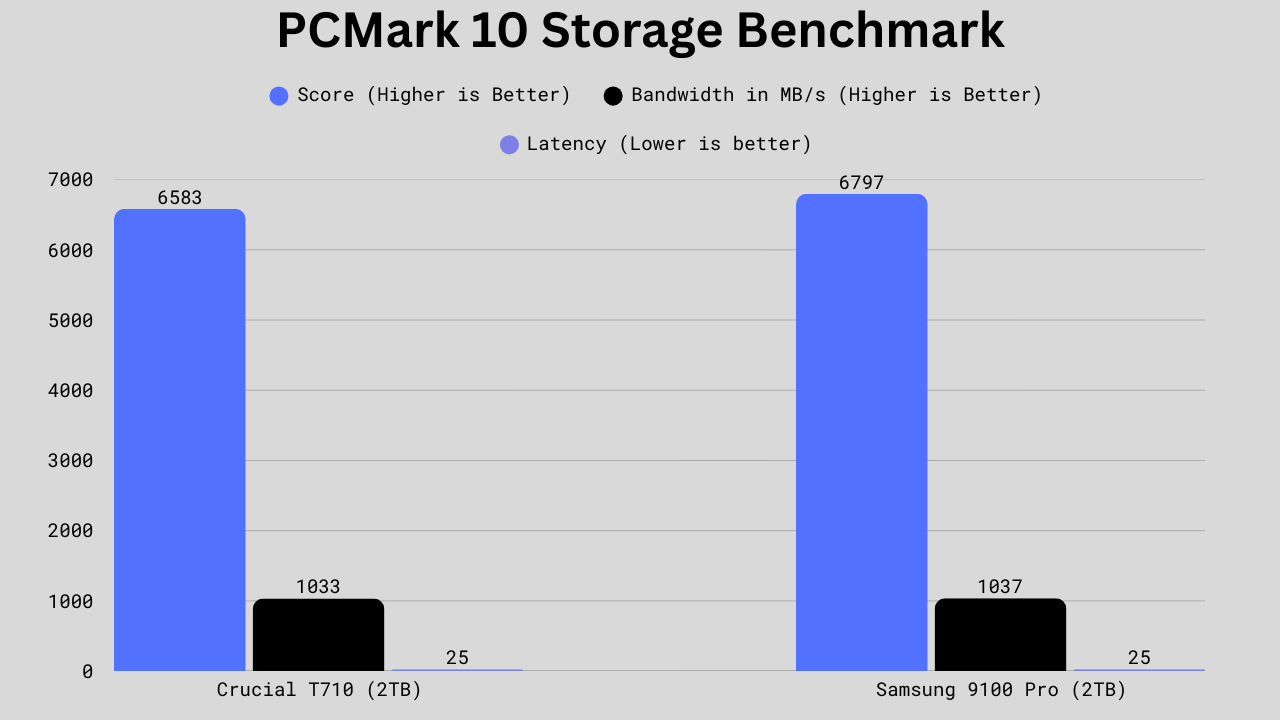
In PCMark 10’s storage benchmark, the Samsung 9100 Pro takes a lead over the Crucial T710. The Samsung 9100 Pro scores 6,797 PCMark 10 points, about 3.2% higher than the T710’s 6,583. Bandwidth is nearly identical, with the 9100 Pro at 1,037 MB/s versus 1,033 MB/s for the T710, a negligible 0.4% advantage. Latency is tied at 25 microseconds for both drives, showing no practical difference in responsiveness. Overall, while the Samsung 9100 Pro edges ahead slightly in benchmark score, real-world performance between the two SSDs is effectively on par.
3DMark Storage Test for Gamers
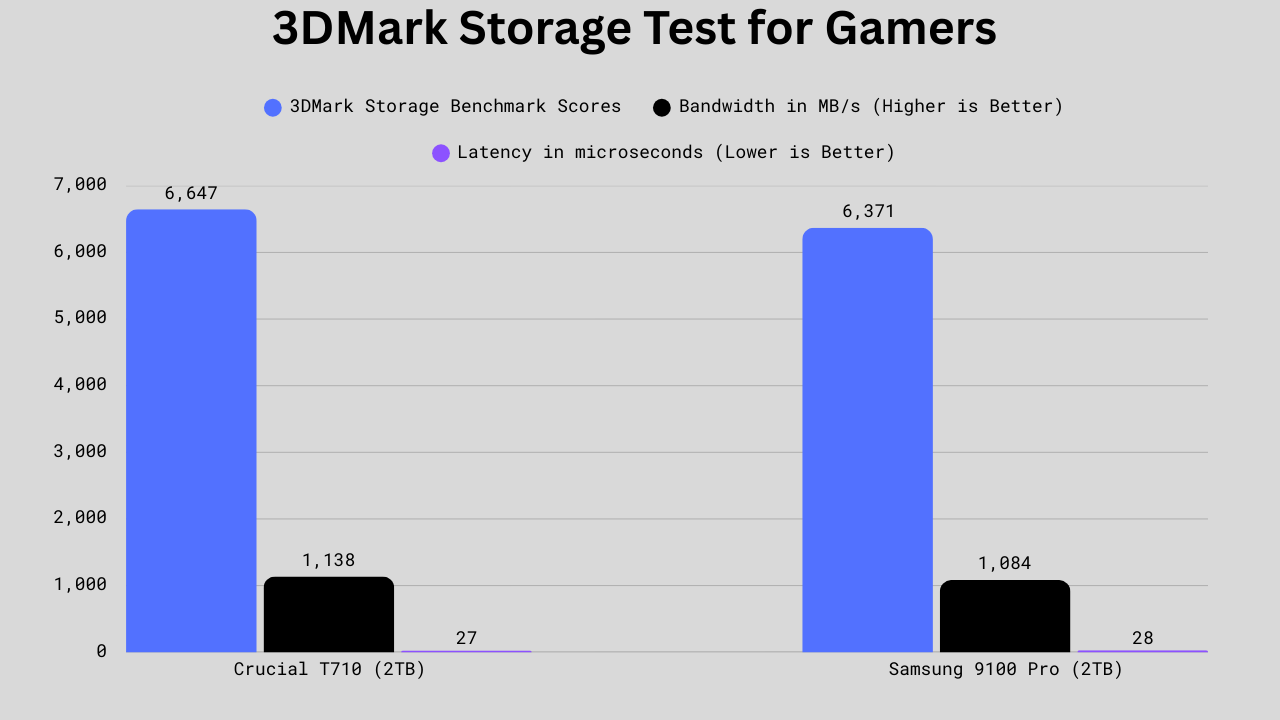
In the 3DMark Storage Test for Gamers, the Crucial T710 holds a clear edge over the Samsung 9100 Pro. The T710 scores 6,647 points, which is about 4.3% higher than Samsung’s 6,371. Bandwidth is also higher in the T710 at 1,138 MB/s compared to 1,084 MB/s, a 5% advantage. Latency is slightly better on the Crucial drive as well, coming in at 27 microseconds versus 28 microseconds, a 3.6% improvement. Overall, the T710 has a higher gaming-oriented storage performance, with faster throughput and lower latency, making it the more responsive option in this test.
CrystalDiskMark Sequential Read/Write Scores Comparison
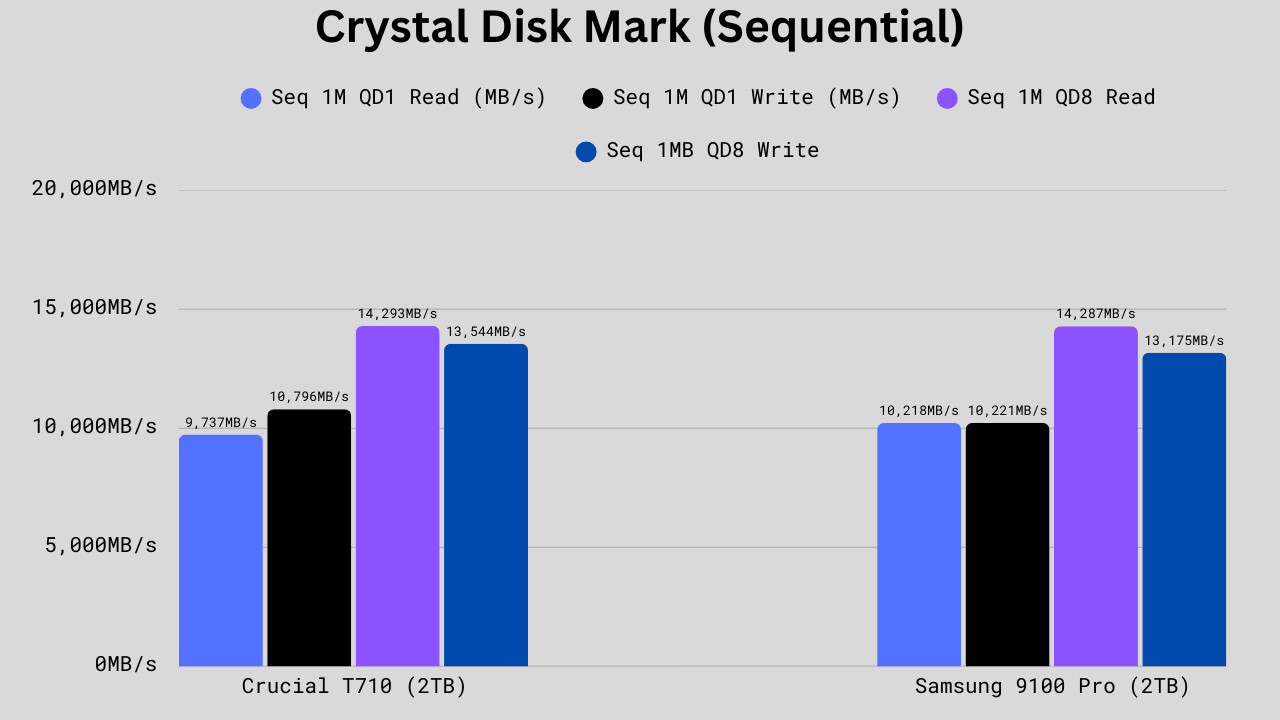
In CrystalDiskMark’s sequential tests, the Crucial T710 and Samsung 9100 Pro have different advantages in different scenarios. For QD1 read, Samsung leads slightly at 10,218 MB/s versus 9,737 MB/s, a 4.9% advantage. In contrast, the T710 takes the edge in QD1 write, reaching 10,796 MB/s compared to 10,221 MB/s, a 5.6% improvement. At QD8 read, performance is essentially tied, with the T710 at 14,293 MB/s and the Samsung at 14,287 MB/s. Finally, in QD8 write, the T710 again pulls ahead, hitting 13,544 MB/s versus 13,175 MB/s on the Samsung, about a 2.8% lead. Overall, the T710 shows stronger write performance while the Samsung edges out slightly in single-queue read speed, leaving them very closely matched in sequential workloads.
CrystalDiskMark Random Read/Write Performance
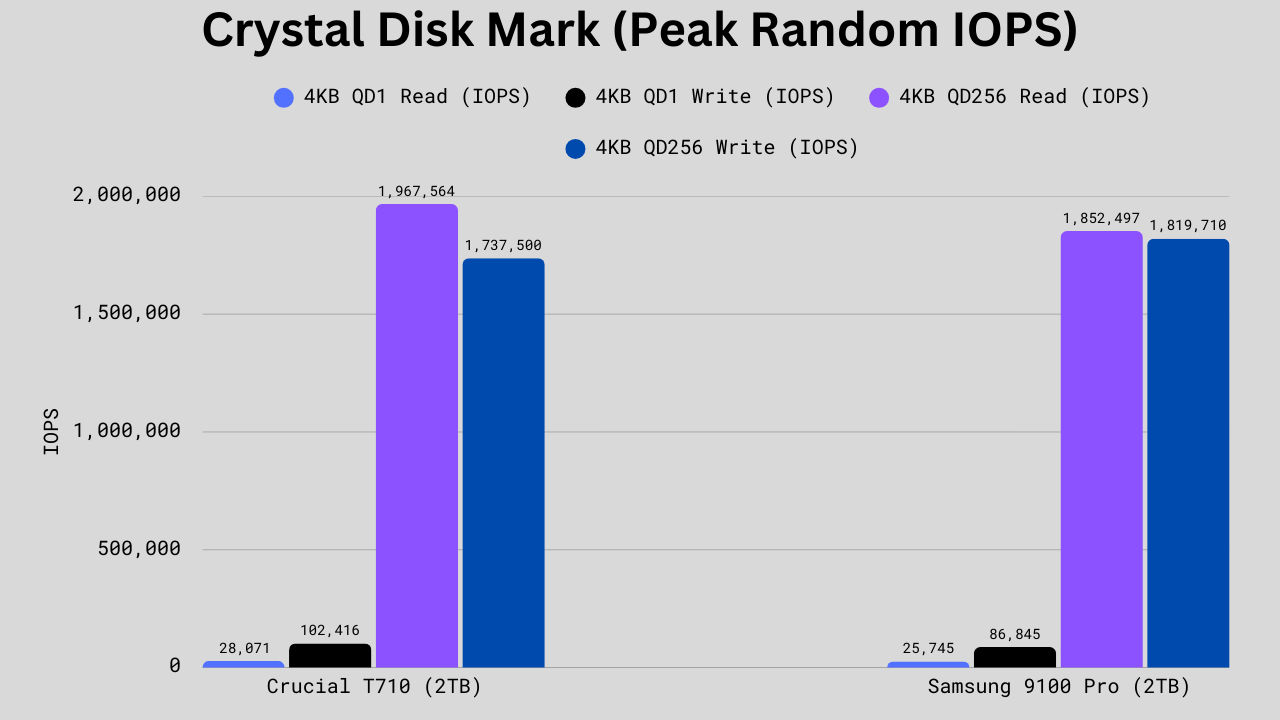
In CrystalDiskMark’s peak random IOPS test, the Crucial T710 shows stronger low-queue performance, while the Samsung 9100 Pro offered at higher queue depths. At 4KB QD1 read, the T710 reaches 28,071 IOPS, about 9% higher than Samsung’s 25,745. Similarly, for 4KB QD1 write, the T710 delivers 102,416 IOPS versus 86,845, a solid 18% advantage. However, the balance shifts at QD256 read, where Samsung leads with 1,852,497 IOPS, edging out the T710’s 1,967,564 by about –5.8% in reverse. Finally, in QD256 write, Samsung again takes the crown with 1,819,710 IOPS compared to 1,737,500, a 4.7% gain. Overall, the T710 excels in responsiveness at lower queue depths, making it better for everyday tasks, while the Samsung 9100 Pro shines under heavy, parallel workloads.
Transfer Rate Comparison
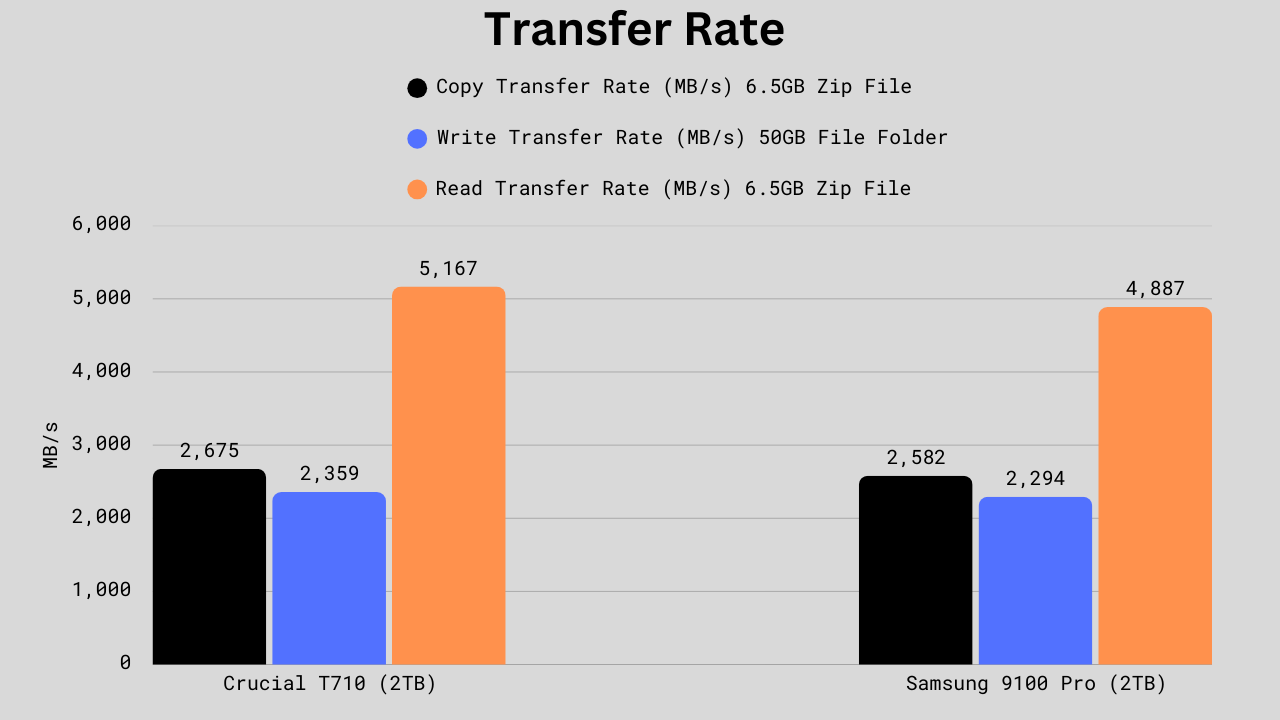
In real-world transfer rate testing, the Crucial T710 demonstrates a slight edge overall against the Samsung 9100 Pro. In the 6.5GB zip file copy test, the Crucial T710 reaches 2,675 MB/s, just 3.5% faster than the 9100 Pro’s 2,582. However, in the 50GB file folder write test, the T710 leads narrowly with 2,359 MB/s versus 2,294 MB/s, about a 2.8% advantage. The biggest difference comes in the 6.5GB zip file read test, where the T710 delivers 5,167 MB/s, outperforming Samsung’s 4,887 MB/s by roughly 5.7%. Overall, while Samsung edges ahead in copy performance, the Crucial T710 provides stronger write and especially read transfer speeds, making it the more balanced performer for mixed workloads.
Power Consumption and Efficiency
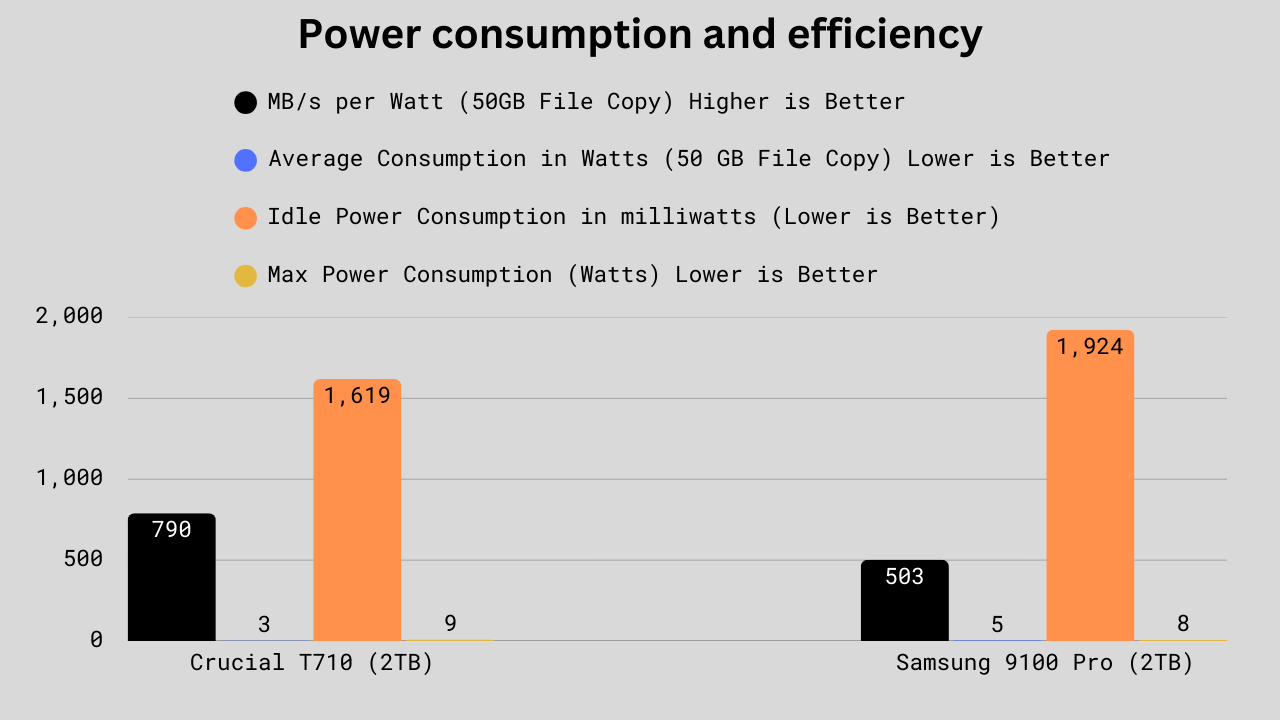
In terms of power efficiency, the Crucial T710 comes out ahead in most categories compared to the Samsung 9100 Pro. During the 50GB file copy test, the T710 delivers 790 MB/s per watt, which is about 57% more efficient than Samsung’s 503 MB/s per watt. This is backed by its lower average power draw of 3W, compared to 5W for the Samsung, representing a 40% reduction. At idle, the T710 also consumes less, sitting at 1,619 mW compared to 1,924 mW, a 15.9% improvement. The one area where Samsung holds the advantage is in maximum power consumption, peaking at 8.00W, which is 9.1% lower than the T710’s 8.80W. Overall, the T710 is the more efficient drive under typical and idle workloads, while the Samsung is slightly better optimized for peak load scenarios.
TBW, MTBF, DWPD, and Warranty Period
| Feature | Crucial T710 | Samsung 9100 Pro |
|---|---|---|
| Endurance (TBW) | 1TB: 600 TBW 2TB: 1200 TBW 4TB: 2400 TBW | 1TB: 600 TBW 2TB: 1200 TBW 4TB: 2400 TBW 8TB: 4800 TBW |
| Warranty | 5 Years | 5 Years |
| DWPD | 0.3 | 0.3 |
| MTBF | 1.5 Million Hours | Unknown |
The warranty period, TBW, and DWPD of both the SSDs are the same. The MTBF of T710 is 1.5 million hours, whereas data for MTBF in 9100 Pro isn’t found.
Technical Specifications
| Specification | Crucial T710 | Samsung 9100 Pro |
|---|---|---|
| Controller | Silicon Motion SM2508 | Samsung’s Presto (S4LY027) |
| Controller Architecture | ARM 32-bit Cortex-R8 + ARM 32-bit Cortex-M0 (5-Core) | ARM 32-bit Cortex-R8 |
| DRAM Specifications | Micron’s LPDDR4-4266 1TB: 1×1024 MB 2TB: 1×2048 MB 4TB: 1x 4096 MB | Samsung’s LPDDR4X DRAM 1TB: 1×1024 MB 2TB: 1×2048 MB 4TB: 1x 4096 MB 8TB: 1x 8192 MB |
| SLC Write Cache | 1TB: – 2TB: approx. 368 GB (dynamic only) 4TB: – | 1TB: approx. 114 GB (108 GB Dynamic + 6 GB Static) 2TB: approx. 226 GB (216 GB Dynamic + 10 GB Static) 4TB: approx. 442 GB (432 GB Dynamic + 10 GB Static) 8TB: – |
| NAND Flash | Micron’s B68S FortisFlash | Samsung’s V8 TLC V-NAND |
| Topology | 276-Layers | 236-Layers |
| NAND speed | 3600 MT/s | 2400 MT/s |
| Read Time (tR)/Program Time (tProg) | 32 µs/320 µs | 40 µs/390 µs |
| Die Read Speed | – | 1600 MB/s |
| Die Write Speed | 300 MB/s | 164 MB/s |
| Encryption | AES-256, TCG Opal | AES-256, TCG Opal |
| Power Loss Protection | No | No |
| SMART/TRIM/PS5 Support | Yes/Yes/Yes | Yes/Yes/Yes |
For the matching variants, the DRAM is of the same size, i.e., approximately 1GB per 1TB. The SLC cache in the 2TB variant of the Crucial T710 is around 142 GB bigger. The raw NAND speed is higher in the T710, while the die read/write speed is higher in the Samsung 9100 Pro. So, the tech specs of both drives are pretty impressive, and the benchmarks showed us their impacts.
Price Difference


As I write this article, the 2TB Crucial T710 is available for $298.75 at NewEgg. The 2TB 9100 Pro, on the other hand, can be purchased for $199.99. So, you can save around $100. The same price difference can be seen with different variants.
Which One Should You Choose: Samsung 9100 Pro or Crucial T710?
The benchmark results are mixed, and we can’t declare a clear winner. So, the selection will depend on your brand choice, technical specifications, thermals, and power consumption.
I would go for the Samsung 9100 Pro without a second thought if I had to choose between the two. This is because the performance difference is minimal, while the 9100 Pro saves me a lot of money. Secondly, I would make this decision because of the brand value.
The Crucial T710 is definitely a beast. It surpasses Samsung’s fastest drive in several key areas. So, for enthusiasts, professional gamers, content creators, and other professionals, it would offer the top performance achievable by the Gen 5.0 interface. So, if you can afford it, it will surely give you an edge, but don’t expect huge gains, as the actual difference is hardly noticeable.
So, clearly, the 9100 Pro offers a better price-per-GB along with acceptable Gen 5.0 performance.

